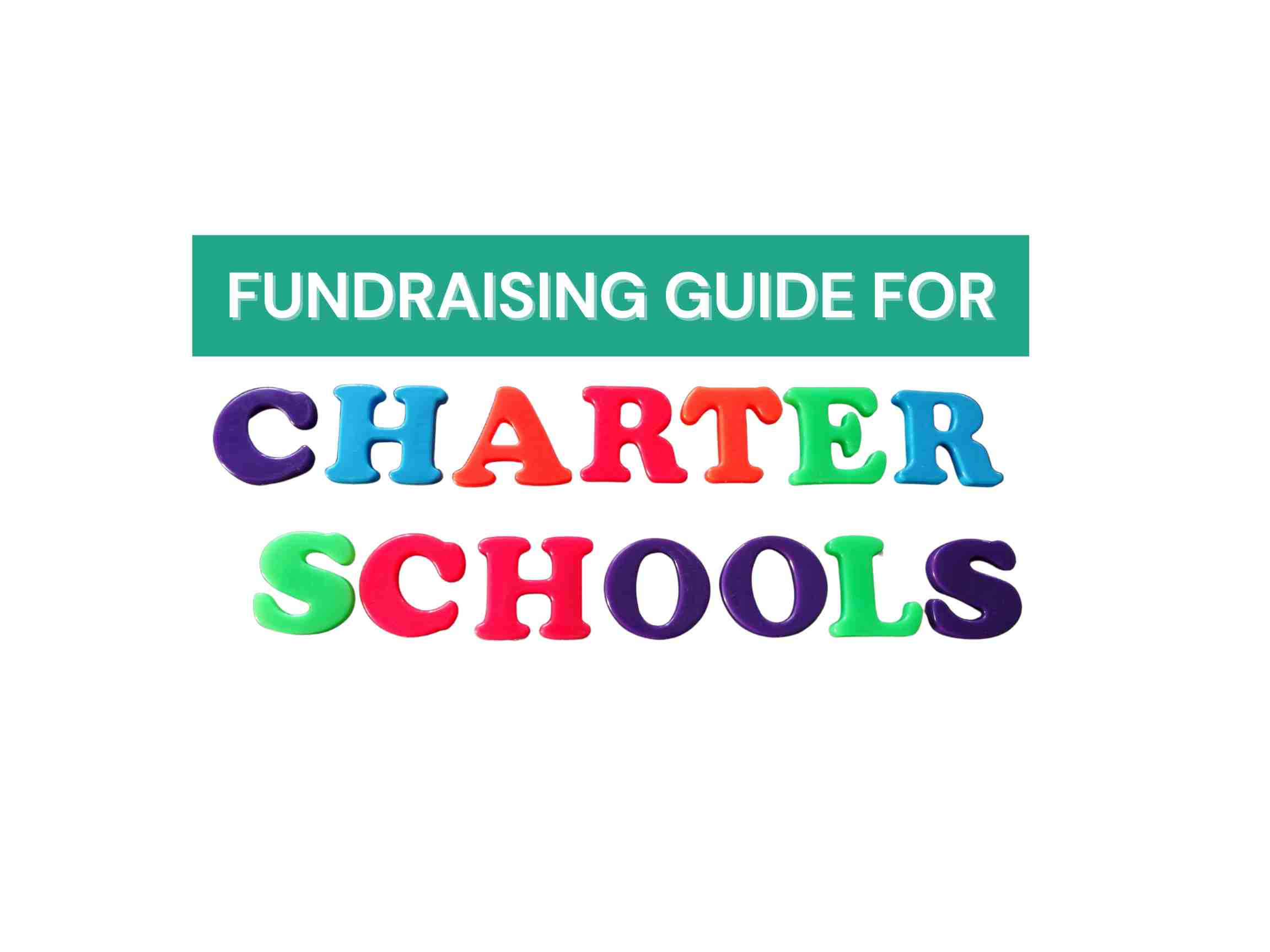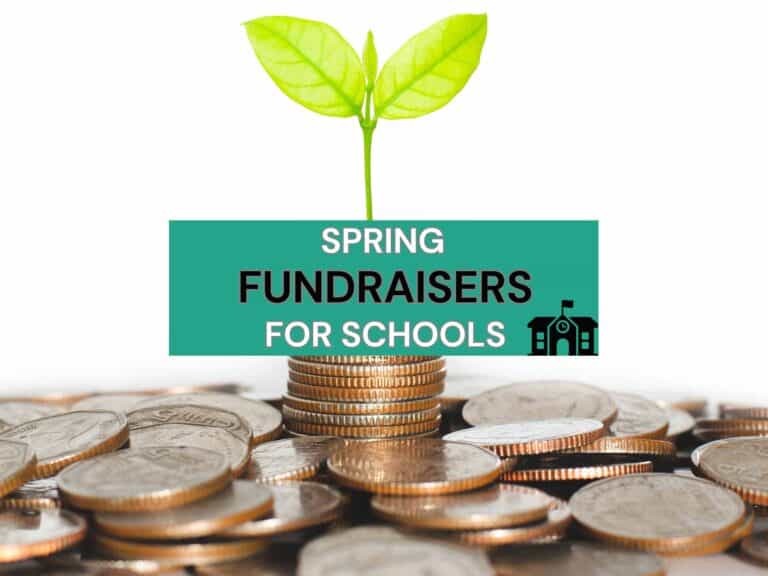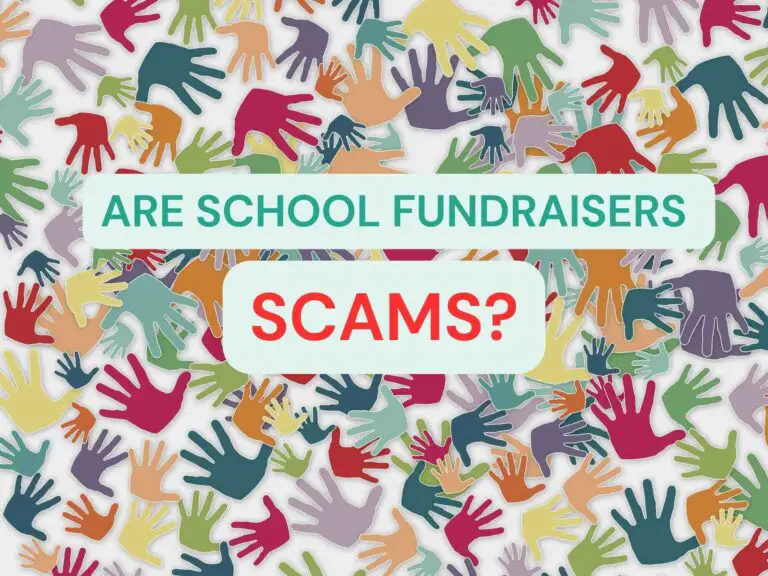Fundraising For Charter Schools: Full Guide with Ideas
This post may contain affiliate links. If you purchase through one of these links, I may receive a small commission at no extra cost to you. As an Amazon Associate, I earn from qualifying purchases.

Considering fundraising for charter schools? Want to know how to go about charter school fundraising?
Navigating the world of charter schools entails exploring innovative education models and securing funding that ensures these models thrive. Charter schools, while publicly funded, often encounter financial shortfalls due to lower per-student government funding and additional costs not covered by traditional budgets.
To fill this gap and keep the wheels of innovation turning, charter schools need to embark on various fundraising efforts.
This article delves into the reasons why these unique educational institutions need additional funds, outlines creative and effective fundraising strategies, and emphasizes the importance of community involvement in these initiatives. Read on to understand the intricate relationship between charter schools and fundraising, and how the right strategies can fuel progress and student success.
What is a Charter School?
Charter schools provide an alternative to traditional public schools. They are public schools with more freedom in their operations, allowing them to employ innovative education models.
Operating under a “charter,” these schools are granted autonomy in exchange for greater accountability. Charter schools typically function independently from the traditional school district.
It’s important to note, however, they are held to account for academic results and for upholding the promises outlined in their charters by sponsors, which could include a state, district, or nonprofit organization.
Why does a Charter School need Funds?
It may be questioned why charter schools need additional funds, given they are publicly funded. This is because charter school funding by the state is lesser than public schools. In other words, charter schools receive less government funding per student compared to traditional public schools.
This lack of funding necessitates additional funds to cover these costs. These financial shortfalls can affect various areas such as classroom supplies, technology, after-school programs, extracurricular activities, sports or special projects, and school clubs not funded by the regular budget.
Fundraising for charter schools is a must for the sustainability of charter schools.
Charter School Fundraising – A Complete Guide

Given that charter schools rely heavily on fundraising activity, it is important for charter schools to set up a proper framework to undertake, execute and manage the fundraising activities. This section would provide you with a complete overview of fundraising ideas for charter schools, and the importance of seeking community participation.
Fundraising Ideas for Charter Schools
1. Seek Innovative Sponsorships
Charter schools can tap into a rich resource within their local community: businesses interested in investing in education. Sponsorship programs can provide a mutually beneficial partnership between the school and local businesses. Through these programs, businesses can sponsor specific programs, events, or needs of the school, thus demonstrating their commitment to community development.
These sponsorships can take various forms.
School supply partnerships
For instance,
– a local tech company could sponsor a computer lab or provide equipment, allowing students access to state-of-the-art technology.
– a bookstore might sponsor a reading program or donate books to the school library.
Event-based partnerships
Companies can also sponsor school events such as a science fair, a sports event, or an arts festival, helping to cover the costs of these events while also showcasing their commitment to local education.
In-kind sponsorships to cover costs
Businesses can also provide in-kind donations – goods, services, or time instead of cash. These donations could be as diverse as providing free printing services for school brochures, catering for school events, or employees volunteering their time for school improvement projects.
Innovative percentage-back programs
Percentage-back programs are another form of sponsorship. In these programs, businesses pledge to give back a percentage of their sales to the school when customers mention the school or present a specific card or code at the time of purchase. This approach encourages the school community to support local businesses, knowing a portion of their expenditure will benefit their school.
2. Utilize Crowdfunding Smartly
In 2022 K–12 schools experienced a 5.7% increase in overall fundraising and a 12.7% increase in online fundraising, according to Blackbaud. This shows the significant role played by individual donors and crowdfunding in the overall fundraising efforts of educational institutions.
For charter schools that rely heavily on fundraising, crowdfunding can offer a convenient platform to reach a broader audience, extending beyond the local community to potential donors across the globe. By utilizing online platforms like GoFundMe, DonorsChoose, or Fundly, charter schools can share their stories and fundraising goals with a wider audience.
The concept is simple yet effective: create a campaign, share it widely, and people who resonate with the cause can contribute. Whether the goal is to finance a new arts program, fund a field trip, or upgrade technology in the classrooms, crowdfunding can be a key tool in the fundraising arsenal of charter schools.
The success or failure of the crowdfunding efforts depends entirely on the drafting of the campaign. Showcase how your school is unique, elaborate on its strengths and contribution to the growth and development of its kids. The school’s growth trajectory, student performance statistics, goodwill, and social standing play a crucial role.
Running a successful crowdfunding campaign requires careful planning and regular updates to keep the momentum going. Schools must be prepared to invest time in creating a compelling campaign, promoting it, and keeping donors engaged.
In many cases, the effort can pay off handsomely, as successful crowdfunding campaigns can bring in significant funds, raise the school’s profile, and engage the wider community in the school’s mission and needs.
3. Conduct Annual Giving Campaigns
Annual giving campaigns can serve as a cornerstone in charter school fundraising efforts. As the name suggests, these campaigns are run yearly and offer an opportunity for the school to reach out to its community, including parents, alumni, staff, and other supporters, for donations.
What sets annual giving campaigns apart is their regularity and scope. Because these campaigns are conducted yearly, they can become a well-recognized tradition that the school community looks forward to and anticipates.
The campaign could have a different theme every year.
– The theme could focus on broad needs such as supplementing the school’s general fund or funding facility improvements.
– the theme for some years could be specific, like new sports equipment, technology upgrades, or special educational programs.
Transparency is crucial in annual giving campaigns. Donors appreciate knowing how their money will be used, and clear communication about the campaign’s goals can encourage higher levels of giving.
Charter schools might share their plans for the funds through newsletters, social media posts, or dedicated pages on their website, providing regular updates as the campaign progresses and after the funds are put to use.
It’s also beneficial to make giving as accessible as possible. Offering multiple ways to donate, including online, by mail, or even in person, ensures everyone can participate in a way that suits them best. Also, giving options such as one-time donations, recurring gifts, or pledges that can be fulfilled over time can accommodate different donor preferences and financial situations.
4. Host Fun School Fundraiser Events
Hosting events such as carnivals, talent shows, or silent auctions can generate funds while also fostering community engagement. But fundraising through these modes should only be undertaken after you have sought funding through the above options. School fundraisers may seem scammy if too many of those are held throughout the year.
Also, bear in mind that even these events require extensive planning and volunteer involvement. But if organized properly, with full transparency towards fund allocations, the rewards can be significant in terms of funds raised and community building.
Some fun event ideas for charter school fundraising are
- Walk-a-thon/Run-a-thon: This event encourages fitness and participation, as students gather pledges for every lap they complete. It promotes health while simultaneously generating funds.
- Read-a-thon: A reading-centric event allows children to secure sponsorship for every book they read. This promotes a love for reading and raises funds for a cause.
- Talent Show: Showcasing students’ talents can also be a fundraising opportunity. Tickets can be sold to this entertaining event, generating funds and building students’ confidence.
- Art Exhibition: Turning the school into an art gallery for a day displays students’ creativity. Artworks can be auctioned or sold to raise funds while encouraging a love for the arts.
- Spelling Bee or Quiz Bowl: Academic competitions can also be fun fundraising events. Participants collect pledges, and attendees buy tickets to contribute to the cause.
- School Fete: A school fete fundraiser can transform the educational space into a bustling event. Students can run game booths, face painting stations, or bake sale tables, popcorn counters, and fruit stalls creating a lively way to raise funds.
- Product Sale Stalls: Selling items like gourmet popcorn, wrapping paper, or cookie dough can be an effective way to raise money. While these initiatives require organization and effort, students’ active involvement can encourage community participation. These stalls could be set up as part of fetes or could become a regular feature of the school campus.
5. Rigorously Apply for Grants
Unlike other forms of fundraising that involve a direct ask to the community or organizing events, seeking grants for charter schools involves applying for funds from various organizations, including government entities, foundations, and corporations.
Grants offer the possibility of substantial funding, often earmarked for specific purposes such as technology enhancement, curriculum development, facilities improvement, or special programs. This can enable charter schools to embark on projects or improvements that might be beyond their reach through traditional funding methods.
The process of applying for a grant generally involves writing a proposal that outlines the school’s needs, the project for which funding is sought, and how the project will impact the school and student outcomes. While this can be time-consuming and competitive, a well-written, persuasive grant proposal can result in significant funding. You could consider working with a grant writer or a staff member skilled in grant proposals to maximize their chances of success.
6. Use Online Charity Shops to your advantage
Online charity shops represent a novel way for charter schools to raise funds. Think of this approach as a digital garage sale, running throughout the year. These platforms enable schools to sell donated items online, with some or all of the proceeds going directly to the school.
One popular platform for this type of fundraising is eBay for Charity. Schools can set up their own ‘shop’ to sell donated items. This can range from used books and uniforms to more valuable items like electronics, art, or collectibles.
The advantages of these shops is that
– they can reach a far larger audience than a traditional, local-based sale
– can open a potential for continuous fundraising and can generate a steady stream of income throughout the year
– they also promote a culture of recycling and reuse among students
The success of this fundraising strategy depends on regular donations of items to sell and the dedication of volunteers who list the items and manage the sales process.
It’s also important to regularly promote the online shop to the school community and beyond, encouraging people to check for new items and make purchases.
7. Strengthen Alumni Giving
Strengthening ‘alumni giving’ is a sustainable source of fundraising
– Unlike parents, who might cease giving when their children graduate, alumni are forever connected to the school.
– As the alumni progress in their careers and lives, their capacity to give may even increase.
To involve the alumni in the school’s current life
– Invite them to school events,
– call them as a guest of honor for various mentoring events and have them share their experiences with current students,
– offer them roles on advisory boards of the school
Charter School Fundraising – FAQs
Are charter schools private or public?
Charter schools are publicly funded schools. They operate under a contract, or a “charter,” that grants them more autonomy than traditional public schools in return for increased accountability. They are open to all students, do not charge tuition, and are nonsectarian, making them a part of the public school system.
What role does the Board play in charter school fundraising?
The Board plays a critical role in charter school fundraising. They help set fundraising goals, devise strategies, and may actively participate in securing funds. This could involve connecting the school with potential donors from their network, advocating for the school’s needs in the community, or assisting with grant applications. Essentially, the Board acts as a driving force and key facilitator in the fundraising process, contributing to the school’s financial health and long-term sustainability.






